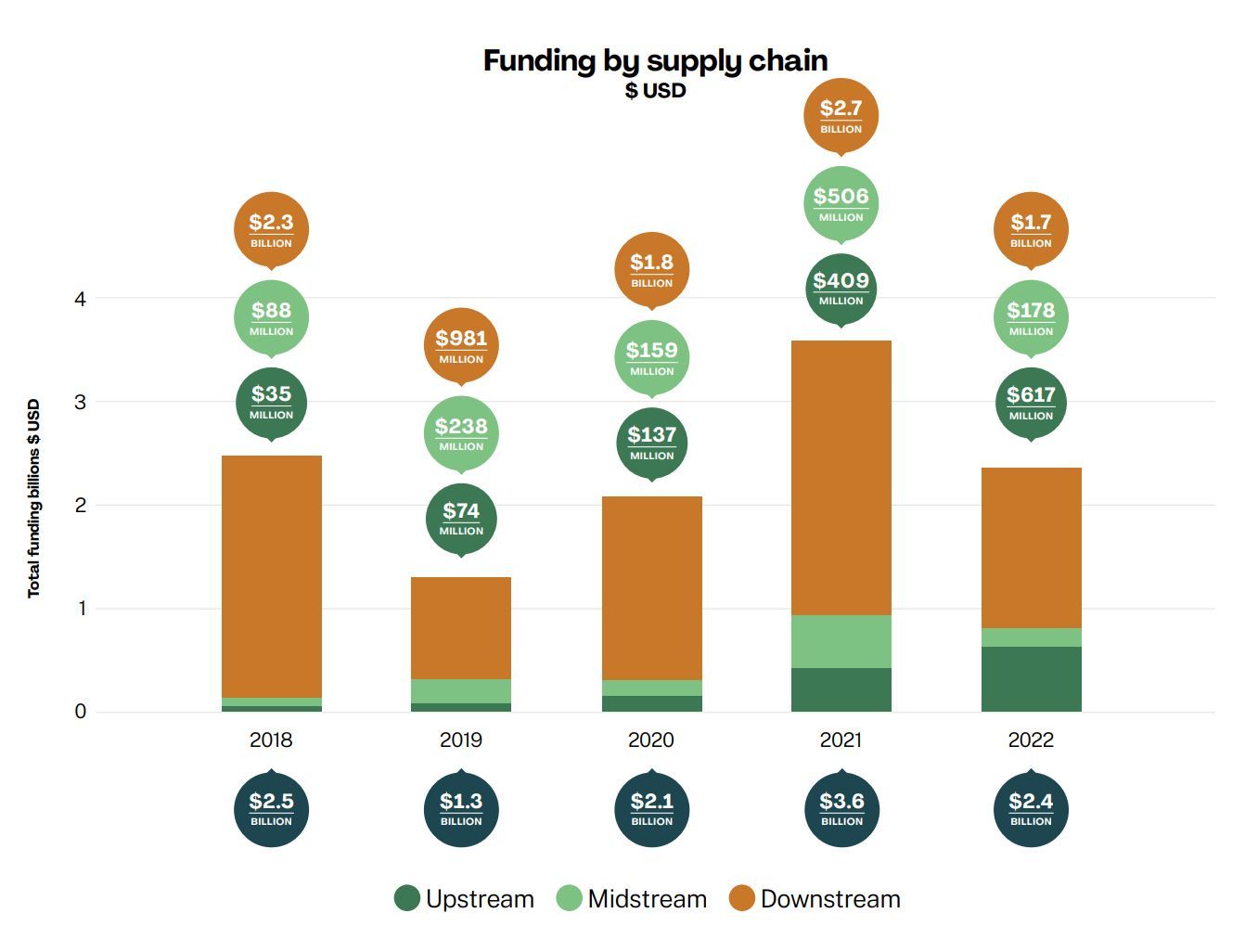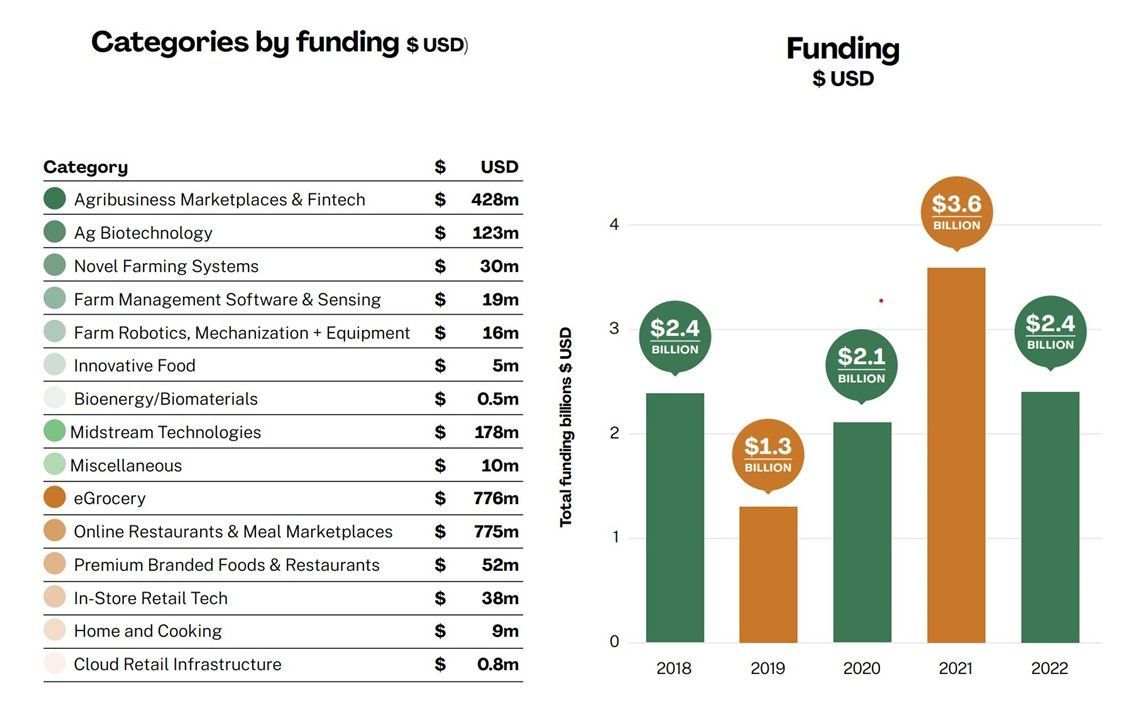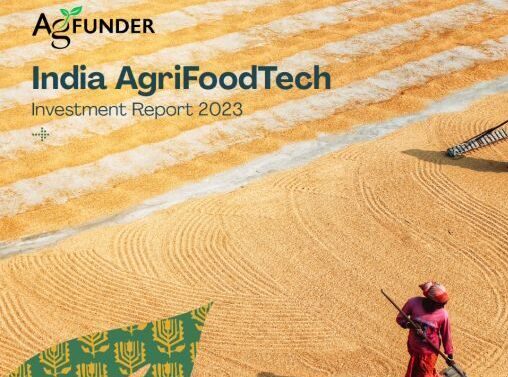Editor’s Note: AgFunder is AFN’s parent company. Please note, AgFunder has adjusted its reporting on Indian agrifoodtech investment to follow the calendar year, in line with the global report. Previous AgFunder India reports were based on the Indian fiscal year of April-March.
2022 was a grim year for agrifoodtech investing, and India was not immune to the headwinds impacting global markets, with funding to Indian startups in the field dipping 33% year-over-year to $2.4 billion from $3.6 billion in 2021, according to the India AgriFoodTech Investment Report 2023.
The deal count dropped 43% to 133 in 2022.
To place this in context, overall global agrifoodtech funding fell 44% in 2022 to $29.6 billion in 2022 with a 19% drop in deals, while global venture funding dipped 35% vs 2021.
However, a deeper dive into the figures shows several bright spots as investors turned their attention upstream, suggests the report, which was put together by food, agriculture, and climate-tech venture capital firm AgFunder in collaboration with agtech investor Omnivore.
While funding to startups in downstream and midstream categories fell 37% and 65% respectively in 2022, investments rose 50% in upstream categories in India, which recently overtook China as the world’s most populous country.
Furthermore, India became the second best funded market for agrifoodtech startups in 2022, after the US and overtaking China for the first time.
A leading emitter of greenhouse gases, India is also among the countries most vulnerable to the impacts of climate change. Water stress, heat waves and drought, severe storms and flooding have the potential to alter growing seasons and wreak havoc on agriculture and food production. And this in turn is driving efforts to deliver affordable technology solutions to smallholder farmers, says Omnivore managing partner Mark Kahn.
“Across India’s agrifoodtech ecosystem, 2023 will stress test startups, while also being an ideal vintage for VCs who can enter promising deals at cheap valuations. Despite the transient headwinds, agrifoodtech in India will continue to surge ahead.”
Michael Dean, founding partner at AgFunder, added: “It is a challenging funding environment for startups globally and, as our report shows, India is no different. The relative increase in upstream financing is a welcome bright spot and reflects the urgency to fund technologies addressing the multiple inefficiencies in our food production and distribution systems that contribute to climate change and hunger.”

Category still dominated by consumer-facing tech
According to the 2022 report, eGrocery is still the biggest category in agrifoodtech investing in India, with funding up 13% to $776 million in 2022, representing almost a third (32%) of the total funding going to Indian agrifoodtech startups in 2022.
The two big deals in the segment both came in the first half, before foodtech funding fell off a cliff, with direct-to-consumer meat & seafood brand Licious raising $150 million in March and 10-minute grocery delivery app Zepto announcing a $200 million raise in early May.
While investment in eGrocery still rose in 2022 despite dropping dramatically in other markets such as China, the number of deals fell significantly in 2022 vs 2021, with fewer new players expected to enter the market as the sector matures.
Attracting $775 million in funding in 2022, the second biggest category was Online Restaurants & Meal Marketplaces. While this figure was skewed by a $700 million megadeal for food delivery firm Swiggy announced in January 2022, the topline amount was still down sharply vs 2021, notes the report.
“There was limited activity in this category in 2022. The space is currently saturated as there is little-to-no technological innovation and only a few major players dominating the space.”

Upstream: More deals, smaller checks
Heading upstream, while the dollar amounts are smaller, the activity level increased, says the report: “Upstream investments have also become more diverse, with increasing activity in carbon credits (Varaha raised $4 million in December) and ag biotechnology (gas fermentation startup String Bio raised $20m in July, while insect ag startup Loopworm raised $3.4 million in August).”
In the Agribusiness Marketplaces & Fintech category, the third largest in agrifoodtech investment in India, startups raised $428 million in 2022, a 34% jump from 2021. It was also the most active category based on the number of deals.
Full-stack agricultural platform DeHaat took the lead, raising $106 million across two rounds, while b2b animal protein marketplace Captain Fresh raised $50 million in a series C round in early March 2022. Fintech platforms helping rural businesses access finance also attracted funding in 2022, with Neobank Jai Kisan raising $50 million in August and agrifintech startup AyeKart raising $5.5 million in September.
Ag biotechnology—a category covering on-farm inputs for crops and animals including genetics, microbiome, breeding, and animal health—also saw a surge of activity last year, with funding increasing from $1.5 million in 2001 to $123 million in 2022.
Novel farming—a category spanning indoor farms, aquaculture, insect & algae production—experienced a similar boost in funding, enjoying a jump of 110% vs 2021 to $30 million.
Finally, Farm Robotics, Mechanization and Equipment funding surged 128% to $16.5 million, boosted by two tranches of series C funding for Ecozen, a Pune, Maharashtra-based company providing solar-powered irrigation and cold chain storage solutions for farmers.
-
Download the FREE 34-page report, which features profiles of startups including Agrizy, Ecozen, Varaha, Loopworm and S4S Technologies.
You can also receive our weekly data snapshot feature articles, which offer more granular insights from our database, by signing up for the newsletter here.




